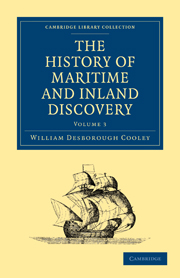Book contents
- Frontmatter
- Contents
- CHAP. I PROGRESS OF GEOGRAPHICAL SCIENCE
- CHAP. II VOYAGES OF BYRON, WALLIS, CARTERET, ETC
- CHAP. III COOK'S FIRST VOYAGE
- CHAP. IV COOK'S SECOND VOYAGE
- CHAP. V COOK'S THIRD VOYAGE
- CHAP. VI COOK'S THIRD VOYAGE CONTINUED
- CHAP. VII VOYAGE OF LA PEROUSE, ETC
- CHAP. VIII EUROPEANS IN THE SOUTH SEA
- CHAP. IX THE COASTS OF AUSTRALIA
- CHAP. X INTERIOR OF NEW HOLLAND
- CHAP. XI VANCOUVER'S VOYAGE
- CHAP. XII INTERIOR OF NORTH AMERICA
- CHAP. XIII ROSS AND PARRY
- CHAP. XIV PARRY'S VOYAGES
- CHAP. XV JOURNEY OF CAPTAIN FRANKLIN
- CHAP. XVI SECOND JOURNEY OF CAPTAIN FRANKLIN
- CHAP. XVII HUMBOLDT'S TRAVELS
- CHAP. XVIII HUMBOLDT'S TRAVELS CONTINUED
- CHAP. XIX SOUTHERN EXTREMITY OF AMERICA
- CHAP. XX EASTERN SHORES OF ASIA
- CHAP. XXI TRAVELS IN THE HIMALYEH
- CHAP. XXII BRUCE'S TRAVELS
- CHAP. XXIII PARK'S TRAVELS
- CHAP. XXIV DENHAM AND CLAPPERTON'S TRAVELS
- INDEX
CHAP. VI - COOK'S THIRD VOYAGE CONTINUED
Published online by Cambridge University Press: 05 October 2010
- Frontmatter
- Contents
- CHAP. I PROGRESS OF GEOGRAPHICAL SCIENCE
- CHAP. II VOYAGES OF BYRON, WALLIS, CARTERET, ETC
- CHAP. III COOK'S FIRST VOYAGE
- CHAP. IV COOK'S SECOND VOYAGE
- CHAP. V COOK'S THIRD VOYAGE
- CHAP. VI COOK'S THIRD VOYAGE CONTINUED
- CHAP. VII VOYAGE OF LA PEROUSE, ETC
- CHAP. VIII EUROPEANS IN THE SOUTH SEA
- CHAP. IX THE COASTS OF AUSTRALIA
- CHAP. X INTERIOR OF NEW HOLLAND
- CHAP. XI VANCOUVER'S VOYAGE
- CHAP. XII INTERIOR OF NORTH AMERICA
- CHAP. XIII ROSS AND PARRY
- CHAP. XIV PARRY'S VOYAGES
- CHAP. XV JOURNEY OF CAPTAIN FRANKLIN
- CHAP. XVI SECOND JOURNEY OF CAPTAIN FRANKLIN
- CHAP. XVII HUMBOLDT'S TRAVELS
- CHAP. XVIII HUMBOLDT'S TRAVELS CONTINUED
- CHAP. XIX SOUTHERN EXTREMITY OF AMERICA
- CHAP. XX EASTERN SHORES OF ASIA
- CHAP. XXI TRAVELS IN THE HIMALYEH
- CHAP. XXII BRUCE'S TRAVELS
- CHAP. XXIII PARK'S TRAVELS
- CHAP. XXIV DENHAM AND CLAPPERTON'S TRAVELS
- INDEX
Summary
On the 8th of December our voyagers left Borabora, and lost sight of the Society Islands; their course was towards the north, and, on the 18th of January, in lat. 21° N., land was discovered, which proved to be an island of considerable size, and beyond it two others successively became visible. As the ships approached the second island, a number of canoes came off from the shore, and the English were no less pleased than surprised to hear the natives speaking the language of Otaheite. When they came on board, they expressed their astonishment at the numerous strange objects that met their eyes with more lively emotions than captain Cook had ever yet witnessed among savage nations. They did not appear to be quite ignorant of iron, yet the wonder and surprise they displayed at every thing they saw left little room to doubt that they were wholly unacquainted with Europeans. When captain Cook went on shore, the people fell flat on their faces before him, as if rendering homage to a superior being. The island was amply provided with the necessaries of life; pigs, fowls, and fruits were purchased advantageously; and captain Cook made an important addition to the natural wealth of the island, by putting on shore some of his live stock. Among other articles brought by the natives for trade were cloaks and helmets, beautifully made with red and yellow feathers. These islanders were not inferior to the inhabitants of the more southerly groups in ingenuity or friendliness of disposition.
- Type
- Chapter
- Information
- The History of Maritime and Inland Discovery , pp. 78 - 92Publisher: Cambridge University PressPrint publication year: 2010First published in: 1831



